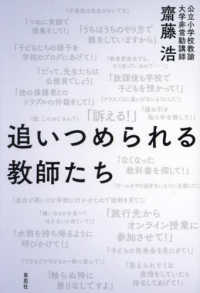- ホーム
- > 洋書
- > 英文書
- > Philosophy
基本説明
This book offers the first comprehensive intellectual biography of Max Horkheimer during the early and middle phases of his life and recovers and reconstructs the model of early Critical Theory that guided the work of the Institute for Social Research in the 1930s.
Full Description
This book is the first comprehensive intellectual biography of Max Horkheimer during the early and middle phases of his life (1895-1941). Drawing on unexamined new sources, John Abromeit describes the critical details of Horkheimer's intellectual development. This study recovers and reconstructs the model of early Critical Theory that guided the work of the Institute for Social Research in the 1930s. Horkheimer is remembered primarily as the co-author of Dialectic of Enlightenment, which he wrote with Theodor W. Adorno in the early 1940s. But few people realize that Horkheimer and Adorno did not begin working together seriously until the late 1930s or that the model of Critical Theory developed by Horkheimer and Erich Fromm in the late 1920s and early 1930s differs in crucial ways from Dialectic of Enlightenment. Abromeit highlights the ways in which Horkheimer's early Critical Theory remains relevant to contemporary theoretical discussions in a wide variety of fields.
Contents
Introduction; 1. Coming of age in Wilhelmine Germany; 2. Student years in Frankfurt; 3. A materialist interpretation of the history of modern philosophy; 4. The beginnings of a critical theory of contemporary society; 5. Horkheimer's integration of psychoanalysis into his theory of contemporary society; 6. Horkheimer's concept of materialism in the early 1930s; 7. The anthropology of the bourgeois epoch; 8. Reflections on dialectical logic in the mid 1930s; Excursus I. The theoretical foundations of Horkheimer's split with Erich Fromm in the late 1930s: Fromm's critique of Freud's drive theory; Excursus II. Divergence, estrangement, and gradual rapprochement: the evolution of Horkheimer and Adorno's theoretical relationship in the 1930s; 9. State capitalism - the end of Horkheimer's early critical theory; Epilogue: toward a historicization of Dialectic of Enlightenment and a reconsideration of Horkheimer's early critical theory.






